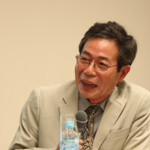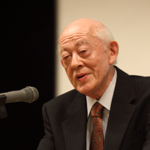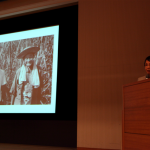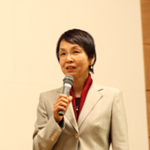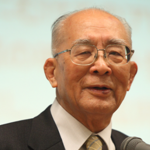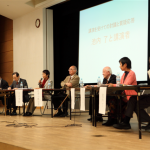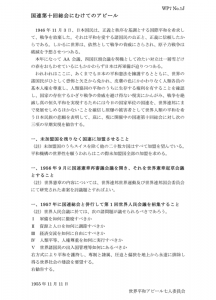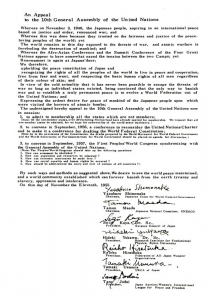WP7 No.104E
July 11, 2011
The Committee of Seven for World Peace Appeal
Kinhide Mushakoji, Hideo Tsuchiyama, Yoshino Oishi,
Kayoko Ikeda, Michiji Konuma, Satoru Ikeuchi, Takashi Tsujii
The Committee of Seven expresses its gratitude to the great contribution provided by the citizens and the governments of the world after the Great Earthquake of East Japan accompanied by the Tsunami and the Accident of the Fukushima Daiichi Nuclear Power Plant, Tokyo Electric Power Company. This includes the technical support invaluable in coping with the Fukushima Nuclear Power Plant Accident. Many dedicated individuals continue to work, day and night, under extremely dangerous condition on the site of the Nuclear Reactors., and deserve special recognition.
The Committee of Seven for World Peace Appeal believes that the Fukushima Daiichi Nuclear Power Plant (Henceforth abbreviated as the Fukushima Nuclear Power Plant) Explosion is an act of men triggered-off by the act of God of the Tsunami, and deserves to be carefully assessed. We appeal to all citizens, researchers, as well as media, business and government leaders to develop an intense dialogue to find ways to cope with the problems which surfaced from this tragedy.
1. The Accident of the Fukushima Daiichi Nuclear Power Plant, Tokyo Electric Power Company
At the Fukushima Nuclear Power Plant, human errors combined with natural calamity caused a cutoff of electric power complicated the already hopeless situation. And among the active six nuclear reactors, three melted down, and with the one of the three already interrupted for regular maintenance, hydrogen explosions occurred in four reactors, and their explosion was followed by a diffusion of radioactive material in the air, on the ground and in the sea. This unconceivable situation made the shutdown of the nuclear reactors unavoidable. All the 20 Nuclear Reactors on the Pacific coast as well as the Uranium Reprocessing Plant in Rokkasho-Mura are not functioning since the Fukushima Nuclear Power Plant Accident.
Even now, after four months have elapsed since the catastrophe, the nuclear fuel continues to be over-heated and cannot be controlled and stabilized. Although a possibility of rapid transformation of the present situation decreases, the danger of a new hydrogen explosion might occur. On the other hand, the highly polluted water used as coolant is still unmanageable. This included, the diffusion of radioactive material into the ground and beyond the borders of the Plant could not been put under control. This is why, even now, it is impossible to declare that the nuclear accident is over.
The Tokyo Electric Power Company (henceforth abbreviated as TEPCO) and the Nuclear and Industrial Safety Agency, under the Ministry of Economy, Trade and Industry (and formerly Ministry of International Trade and Industry) have proceeded to use Nuclear Power Stations in an easygoing way. As a result they could not deal with the accident properly and the damage expanded unnecessarily.
The local inhabitants of the regions affected by the East Japan Earthquake, who were forced to leave their houses, lands and belonging, experience intensive insecurity having been suddenly separated from their families, and having lost their links with the neighborhood community, many lost the pet animals and plants they loved, and have no more jobs guaranteeing their stable livelihood. The victims include those who experienced radioactive exposure and have this additional cause of insecurity especially intolerable. We must realize that all the victims of the Great Earthquake experience an incredible amount of stress and anxiety.
2. The right to live in peace free from fear and wants.
The citizens of Japan, reflecting the aggression to the peoples of neighboring countries until the World War II, declared in the Preamble of its Constitution that all peoples of the world have the Right to live in peace, free from fear and wants.
The Committee of Seven for World Peace Appeals established in 1955 continues since then to issue appeals for world peace and prosperity from a politically impartial position. It has opposed nuclear weapons and war unconditionally, and has proposed the building of a new world order through an international system of cooperation under a strengthened United Nations.
The Committee issued already in 2009 an Appeal entitled “Towards a World which Recognizes the Importance of Life” and emphasized on the “importance for humankind to realize fully its destructive capacity towards the geosphere and the biosphere” and “the importance that the development of knowledge, the use of power and the market activities be the object of regulation”.
However the crisis management policy adopted by the present government supporting the business community does not take into serious consideration the local inhabitants of the regions affected by the East Japan Earthquake, Tsunami and the Fukushima Nuclear Power accident and especially the right to live in peace of the vulnerable sectors of the civil society.
The people of Japan regret the fact that this right is now violated for the victims of the Great Earthquake of East Japan. Now, the forcefully displaced citizens as well as those who continue to live, under high insecurity, in the neighboring areas of the Fukushima Nuclear Power Plant are living all in situations far from a peaceful life. Not less unpeaceful is the life of citizens in more distant regions from the plant, who live under the fear of possible radioactive exposure. They including the children who are forbidden to play outdoors, the women pregnant or rearing babies, the peasants and fisher people whose product cannot be sold because of possible radioactive pollution, all these people are certainly deprived from the right to live in peace and from other basic human rights. We firmly believe that nobody should be allowed to use the term “as much as possible” used in such an easy-going manner by the government and business leaders. We must give absolute precedence over any other principles our duty to act in solidarity with the victims of the nuclear catastrophe of the Fukushima Nuclear Power Plant, and respect their rights to live in peace in any decision taken by the government and by the corporate community.
The Committee of Seven calls upon the government and the corporate sector of Japan to take into serious consideration the high insecurity of the Geosphere of the Japanese Archipelago, and apply the “Precaution” principle in their decisions which may trigger-off serious consequences for the security of the neighboring regions of the nuclear plants in cases of natural calamities. They should take utmost precaution about possible emergence of situations of acute insecurity which would be too late to prevent once the natural calamity has occurred.
3. Concrete Recommendations for the Shutdown of Nuclear Power Plants which destroy peace of mind and security
The generation of electricity using nuclear energy consists in producing a very large amount of radioactive material from the nuclear fission in the nuclear reactor, and uses the created heat for the production of electricity. Even after closing a reactor, the heat requires several years to be cooled down, and the radioactive materials need to be left under human control for more than ten thousand years. When such control fails to work, for whatever reason, the pollution of the environment, including human bodies, cannot be avoided.
In reality, the fact that during the Chernobyl Nuclear Power Plant Disaster of 1986 and the present Fukushima Nuclear Power Plant Accident caused a massive diffusion of radioactive materials in the environment occurred and many peoples became victims. We have to realize that severe accidents will occur by acts of God and by acts of men. Considering further that
(1) no reliable and safe method of disposal and management has been developed on radioactive materials in the spent nuclear fuel,
(2) the nuclear fuel is not a sustainable resource on earth,
(3) the cost to settle accidents is gigantic,
we have to conclude that the nuclear power station is not a stable and safe energy source in future.
This is why many governments reach the decision to move away from the use of nuclear energy to generate electricity. This implies that the countries taking this decision will not be limited to Switzerland, Germany and Italy. Similar decision will have to be adopted by all nations of the world renouncing to use nuclear energy for electricity generation.
In Japan, the use of nuclear energy to generate electricity began with the building of the first nuclear power station in Tokai-Mura in 1966. Since then this trend grew rapidly and in 1997, after 31 years, the number of nuclear reactors in Japan was 53. After the shutdown of the first nuclear reactor the following year, the total number of reactors varied because some new reactors were built while other older ones were closed. When the Fukushima Nuclear Plant explosion occurred, a total number of 54 reactors existed in Japan. The increase of nuclear reactors had already stopped in 1997. Japan presently occupies the third place after the United States and France in terms of the number of nuclear power stations. There exist in contemporary Japan 11 nuclear reactors under construction, but even if all of the plan will be realized, with the inevitable successive shutdown of existing ones the size of nuclear generation of electricity is bound to decrease. Until now, there was a general policy of the government to continue using the nuclear power station beyond their service life of approximately 30 to 40 years. This policy is based on a check of existing nuclear power stations using the present official guidelines about safety assessment. However, the government recognized the deficiencies of these guidelines after the Fukushima Nuclear Plant Accidents. The guidelines are presently under review, and this is another proof that the present system is highly insecure.
Taking into account the above state of affairs, we propose the five recommendations which follow:
(1) It is necessary to close all the old nuclear reactors which have reached their service life, as the probability of trouble increases.
(2) The construction of all the nuclear reactors for electricity generation presently under construction or in their planning stage must be stopped or abandoned immediately, as the guidelines used in the evaluation of the safety review and assessment conducted by the regulatory authority are admitted by the Government as inadequate..
(3) Under Japan four plates (Pacific Ocean, North America, Eurasia, Philippines) collide with each other and an innumerable number of active faults run across the archipelago. In this situation it is foreseeable that major earthquakes and tsunamis are bound to take place. Thus all the nuclear power plants built close to the active faults and on areas accessible by tsunamis must be immediately closed.
(4) One of the reasons why the Fukushima Nuclear Power Plant Accident cannot be brought to conclusion is that six large-scale nuclear reactors were built close to each-other in an over-crowded site. Most nuclear plants in Japan have plural nuclear reactors. The order of their closing must be decided so that the size of the nuclear plant is immediately reduced.
(5) If there remain some nuclear power plants not yet closed according to the above criteria and all of the following conditions will be cleared, certain reactors may be left active for a strictly delimited time. This will be acceptable only if the possible occurrence of major accidents are clearly formulated and the informed consent of all citizens and all concerned parties are obtained, the nuclear reactor may be left active if appropriate safety measures are adequately taken, and if the approval by domestic and international third parties based on their autonomous evaluation is given, and if the agreement is ascertained about all citizens in the possibly affected area
If the above conditions are met, Japan will become a nation without nuclear power reactors at the latest, when the service life of all functioning nuclear reactors is reached.
4. The Abolition of Nuclear Power Plants is Practicable:
There are people, since immediately after the Fukushima Nuclear Power Plant Accident, who says that nuclear plants are indispensable for Japanese economy. They repeat the phrase “upon securing their safety”, a phrase which is a groundless and not-concrete affirmation used for the past 50 years. The Ministry of Economy, Trade and Industry (and its predecessor, the Ministry of International Trade and Industry) and its external supportive agency, the Nuclear and Industrial Safety Agency, promoted the use of nuclear generation of electricity since the 1950s. Following the Fukushima Accident, they merely declared that the necessary measures have been taken following the Fukushima tragedy, instead of ascertaining the public safety, already when the overall damages caused by the accident were not yet fully known and the area radioactively polluted was still expanding. They also put pressure on the local citizens, in different sites of nuclear plants, to support the reopening of the nuclear reactors stopped for their periodical tests, affirming that the safety of nuclear reactors was proved to be safe after the Fukushima Accident.
We recall the fact that already when the plan of introducing in Japan nuclear power station began to be discussed, the Science Council of Japan (JSC) pointed out, from a purely scientific point of view, the questions regarding public safety against earthquakes, as well as regarding the disposal of nuclear waste, and the soundness of cost. It is now too late to point out the fact that the present casualties caused by the nuclear accident could have been avoided if the government had not totally ignored the remarks made by the scientists in the JSC.
In a world-wide context, the research, development and utilization of renewable natural energy is progressing and expanding well. During the last two years, the investment of China in this field has been highest in the world, and the investment in the field of renewable energy of the United States and France, two top countries of nuclear power plants, is among the top ten. On the contrary Japan invests so far only a very small part of its R and D expenditure in this field, and the gap with other industrialized countries keeps widening.
The energy policy of Japan has been so far dominated by promoters of nuclear energy. The production of electricity and its distribution and consumption was in the hands of electric companies with regional monopoly. All costs of electricity production have been automatically added to the electricity fee paid by the consumers. It is this system which permits practically all R and D expenditures in the field of energy to be monopolized by nuclear energy production, and importation of renewable energy was hampered by a variety of obstacles. This is why the gaps in renewable energy development between Japan and the other industrialized countries is mainly the consequence of these institutional restrictions.
In order that the inhabitants of the Fukushima Prefecture, victims of the recent accident, can be saved from the danger of becoming the victims of another nuclear disaster, the Fukushima Prefecture has started to take initiative to become one forefront Prefecture in renewable energy development. The Committee of Seven welcomes and wishes to extend to this Prefecture all possible support.
This is, nevertheless, not a problem limited to the Fukushima Prefecture, it consists the whole world which is presently faced with the urgent need to decide between two options. Should humankind continue the 20th century approach to control nature and develop a material civilization based on mass production, mass consumption and mass disposal as it did until now, or should it rather decide to adopt a different approach towards nature, treating it with due reverence, combining an awe to its devastating power with a gratitude towards all its gifts, benefitting from them through an ecologically symbiotic civilization.
The Committee of Seven proposes to the concerned citizens of the world the following concrete steps to develop urgently an energy policy oriented towards the second option:
(1) To adopt a clear priority in research, development and utilization of energy resources on renewable natural energy, and to eliminate all institutional obstacles hampering the reorientation of technology and economics from its present emphasis on scale, concentration and standardization to a new orientation stressing scaling-down, de-concentration, and diversification.
(2) The awareness of the necessity to reduce energy consumption is rapidly spreading among the citizens and the corporate community in Japan. Further reduction of electricity consumption, the increased use of energy-saving devices increasing the efficiency of the use of energetic resources, an extensive effort to reduce the fluctuation of high and low times in energy consumption, the introduction of individual household electricity generation reducing the public consumption of electricity in peak hours, all these measures are now under intensive consideration in Japan, where the major problem is the lack of electricity focuses on short peak hours in the summer.
(3) The two above policies will make it possible the accelerated closure of the remaining nuclear plants, and should lead to shorten the time when all nuclear plants are closed down definitively.
In applying the above policies, it is essential to cease thinking that energy should be generated according to an unlimited demand of the national economy, and give absolute priority to the right of the citizens to live in peace free from fear and wants, and reduce the use of energetic resources in accordance with the citizen’s will to live simply within the range of energy resources usable without any danger on their security and prosperity.
Since the mid-1950s, the successive Liberal Democratic Government of Japan developed a national policy to develop the technological capacity of Japan to have access to nuclear armament while not becoming a nuclear weapon country during the time they keep power. In fact the nuclear power stations were developed, and a massive production of plutonium was realized with the acquisition of uranium enrichment. This policy combined with the nuclear umbrella strategy presupposing the usefulness of nuclear weaponry made Japan suspicious of intending an eventual access to the nuclear power club. If Japan decides unambiguously to cease using nuclear power generation of electricity this suspicion will be removed in the eyes of the world.
5. The Strengthening of IAEA Intervention in Nuclear Power Plant
IAEA which was founded in 1957 as a special organization of the United Nations contributed to develop the peaceful use of nuclear energy and to prevent the military utilization of its activities in the non-nuclear weapon countries. The Chernobyl Nuclear Plant Accident of 26 April 1986, the leakage of radioactive materials to environment was terminated after ten days of the accident, and IAEA organized an international expert meeting in Vienna, four months later in August 25 to 29.
At the break of the Accident of the Fukushima Nuclear Power Plant, we hoped that an unconditional cooperation, beyond differences of viewpoints, could be developed, domestically and internationally, towards the earliest resolution of the Accident. This is why we have abstained from any critical remarks until today. However, it is to be regretted that even now four months after the Accident, it is not yet possible to make an accurate assessment of all the aspects of the Accident.
When we study the activities of the TEPCO and of the Nuclear and Industrial Safety Agency they lacked any long range perspective and kept taking short term measures which are simply disappointing. On top of this, their optimistic estimation of the situation caused them to take action only too late and led to the inacceptable aggravation of the disaster. The lack of their transparency made it difficult to assess the real situation and the citizens were thus excluded from the process of recovery. The Government of Japan and TEPCO should have trusted the citizens and tell them frankly about uncertainties and about potential dangers. They did not do so and they have lost the credibility from citizens and this led us to the present impossible situation.
The effect of accident of nuclear power plants expands over the national boarder and the limit of the territorial waters. We hope not to leave measures only to the concerned parties but to concentrate all wisdom together from all over the world. We expect in the future a more active role played by IAEA. This Organization should prepare in peaceful times in preparation of emergencies, international standards on public safety, taking into consideration both the scientific and technological and the social aspects of the safety of nuclear reactors.
IAEA should conduct inspections not only to prevent the military misuse of the nuclear issues, but also to guarantee their full knowledge of the large facilities developed for the peaceful use of nuclear energy.
This would permit their intervention in case of nuclear emergencies, which should not be limited to giving advice in case they are consulted, but a more active role in organizing expert teams and play a leading role in the process towards the complete resolution of the nuclear accidents.
We sincerely expect the IAEA and all member states to discuss this problem.
We wish also to draw the attention of the citizens and the experts concerned about the possible sources of insecurity which accompanies the present trend of export of nuclear plants from industrial countries including Japan to the developing countries. This export is inevitably accompanied by a potential great disaster. Some accidents of nuclear plants may occur following natural calamities, and this may cause unbearable situations of insecurity for the vulnerable citizens in the recipient countries. We firmly believe that such exportation should not be permitted.
We appeal to the international community to take positive actions to develop international cooperation in strengthening the research, development and utilization of renewable natural energy.
6.Concluding Remarks:
Japan experienced a man-made catastrophic situation, the explosion of the Fukushima Nuclear Power Plant, following the acts of God, the Earthquake and Tsunami during the March 11 East Japan Earthquake. Japan, thus, became the victim of both the military use of nuclear power in Hiroshima and Nagasaki, and of its peaceful utilization in Fukushima.
This is why, the Committee of Seven for World Peace Appeals, shares the sincere wish of many citizens of Japan, in calling upon all the peoples of good-will of the World at large to start a global movement towards the abolition of all military use of nuclear power as well as the closure of all nuclear power plants.
PDF Appeal→ 104e.pdf
104e.pdf
![]() 106e.pdf
106e.pdf
